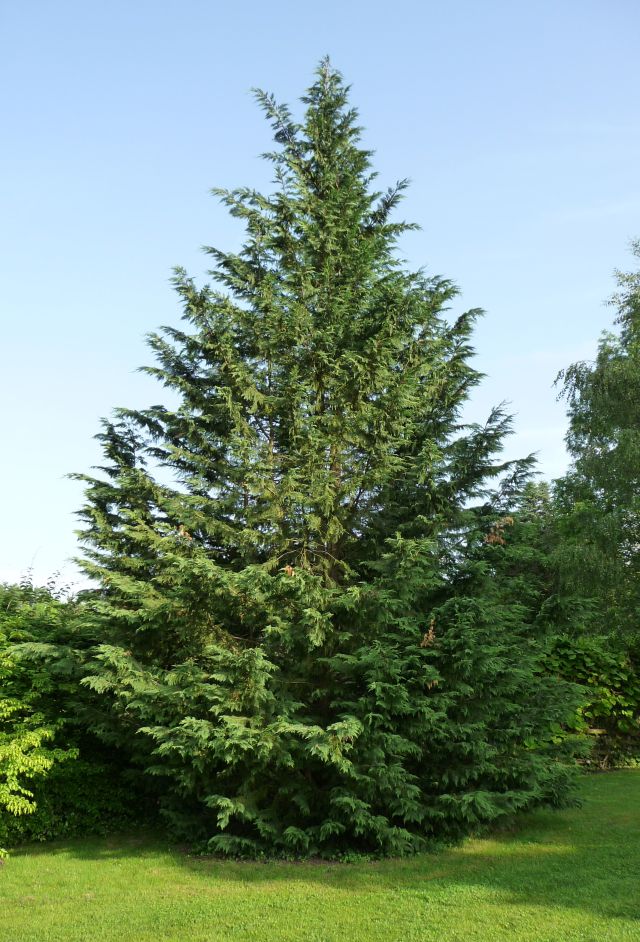 Case 46 never ends, yet now comes ...
Case 46 never ends, yet now comes ...Case 47: Joshu's Cypress Tree
Is the tree outside you? Is it within you? Are you in the tree? In Bodhidharma? What you or not you? What Bodhidharma? What tree?
All such questions do not even begin, nor end, to express the endless coming of the tree in the garden.
Does it grow with time? Does it stand mighty and still and timeless? Which is it?
Are you Joshu? Is Joshu coming from the west as Bodhidharma? As you? As a tree? No coming or going? Thus coming and thus going?
A version of this Koan goes ...
At that time, a monk asked, “What is the intention of the ancestral master [Bodhidharma]’s coming from the west?”
The master said, “The cypress tree at the front of the garden.”
The student said, “Reverend Preceptor, don’t use objects to show people.”
The master said, “I don’t use use objects to show people.”
[The student] said, “What is the intention of the ancestral master’s coming from the west?”
The master said, “The cypress tree at the front of the garden.”
Master Dogen wrote, in riffing on this Koan in Shobogenzo Hakujushi (the Cypress Tree) ...
The principle we should understand here is the point that “the cypress at the front of the garden” is not “an object,” the point that “the intention of the ancestral master [Bodhidharma]’s coming from the west” is not “an object,” the point that “the cypress tree” is not the [subjective] self; for [it is said,], “Reverend Preceptor [Master Joshu] don’t show a person with an object”; for [it is said,] “I don’t show a person with an object.” Which “Reverend Preceptor” is impeded by “Reverend Preceptor”? If he is not impeded, he must be “I.” Which “I” is impeded by “I”? Even if it is impeded, it must be “a person.” Which “object” is not obstructed by the “intention in coming from the west”? For the “object” must inevitably be the “intention in coming from the west.” Nevertheless, the “intention in coming from the west” is not dependent on the “object.” “The intention of the ancestral master’s coming from the west” is not necessarily “the treasury of the eye of the true dharma, the wondrous mind of nirvana.” It is “not the mind”; it is “not the buddha”; it is not “not a thing.”
[The monk’s] saying here, “what is the intention of the ancestral master’s coming from the west?” is not merely a question; it is not merely that “both people can see the same.” Precisely at the time he asks, he cannot see anyone; how much of himself can he get? Going further, [we can say,] he is without fault. Therefore, it is “mistake, mistake.” Because it is mistake, mistake, it is “taking a mistake as a mistake.” Is this not “to accept the hollow and entertain the echo”?
Because “the all-pervading spiritual root turns neither toward nor away,” it is “the cypress tree at the front of the garden”: if it is not an “object,” it cannot be a cypress tree; even if it is an object, it is [said,] “I don’t show a person with an object,” and “Reverend Preceptor, don’t show a person with an object.” It is not an old ancestral shrine. Since it is not an old ancestral shrine, he goes on burying. Since he goes on burying, it is “return my concentrated effort.” Since it is “return my concentrated effort,” it is [said,] “I don’t show a person with an object.” Then what else does he use to “show a person”? It must be “I’m also like this.”
http://scbs.stanford.edu/sztp3/trans...anslation.html
[The monk’s] saying here, “what is the intention of the ancestral master’s coming from the west?” is not merely a question; it is not merely that “both people can see the same.” Precisely at the time he asks, he cannot see anyone; how much of himself can he get? Going further, [we can say,] he is without fault. Therefore, it is “mistake, mistake.” Because it is mistake, mistake, it is “taking a mistake as a mistake.” Is this not “to accept the hollow and entertain the echo”?
Because “the all-pervading spiritual root turns neither toward nor away,” it is “the cypress tree at the front of the garden”: if it is not an “object,” it cannot be a cypress tree; even if it is an object, it is [said,] “I don’t show a person with an object,” and “Reverend Preceptor, don’t show a person with an object.” It is not an old ancestral shrine. Since it is not an old ancestral shrine, he goes on burying. Since he goes on burying, it is “return my concentrated effort.” Since it is “return my concentrated effort,” it is [said,] “I don’t show a person with an object.” Then what else does he use to “show a person”? It must be “I’m also like this.”
http://scbs.stanford.edu/sztp3/trans...anslation.html
A flapping flag is wind flagging is mind winding, blossom bespeaks the spring, a drop holds the taste of the whole ocean (one knows that the ocean holds every drop, yet every drop embodies the whole swirling ocean!).
Not falling into speech or thought, how does one express this tree?
Gassho, J




Comment